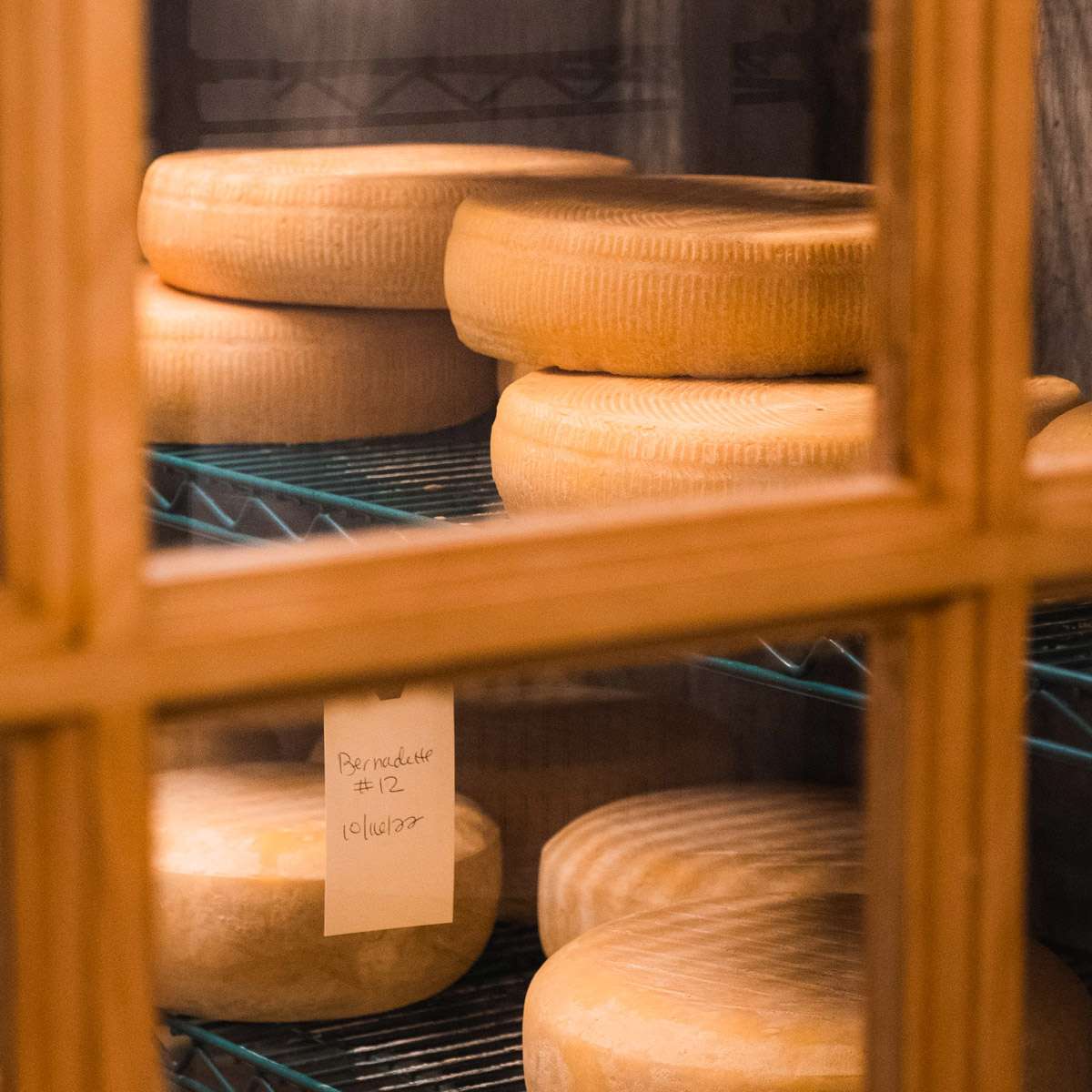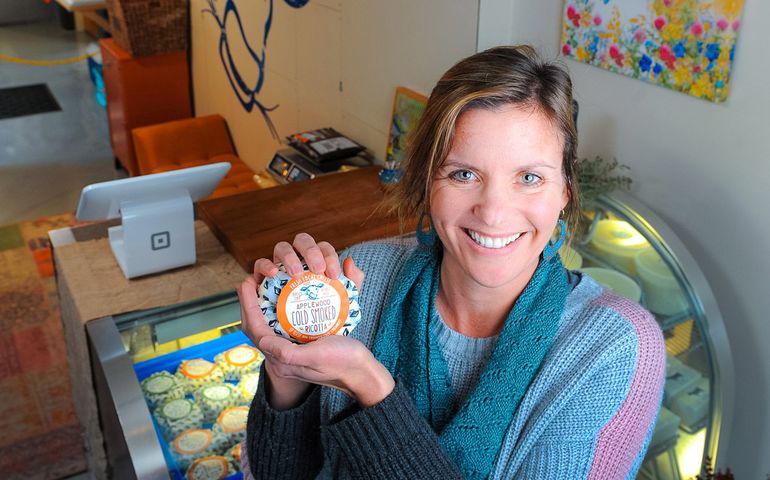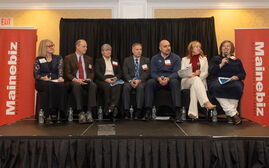
A Skowhegan artisan cheese maker has found innovative ways to grow
 Photo / Fred Field
Amy Rowbottom, founder of Crooked Face Creamery in Skowhegan, has developed a grassroots network of funding, distribution and support.
Photo / Fred Field
Amy Rowbottom, founder of Crooked Face Creamery in Skowhegan, has developed a grassroots network of funding, distribution and support.
Amy Rowbottom has been making cheese for a decade and a half, but in a way it’s been in her blood. Having grown up on and lived on dairy farms for a good part of her earlier life, she has been surrounded by the raw ingredients of cheese.
Once her path as a cheesemaker became clear, she pushed hard to build her business, Crooked Face Creamery in Skowhegan.
At every point of growth, the Norridgewock native had to raise money, attend classes, find real estate, build out space, get certifications, permits. But the process is something she’s gotten good at. In that way, her startup journey is similar to entrepreneurs in any industry.
From her cheese-making operation and retail store at 42 Court St. in Skowhegan, in the Maine Grains building, she is surrounded by photos, cheese products, artwork and the shop dog, an ancient Basset hound named Howard.
Rowbottom talks about her journey: She’s faced challenges at every turn, personally and professionally — starting with no money, being a single mom, finding and fitting out operations space, navigating the pandemic.
“There’s no easy way to get off the ground. You take classes, you get on the road. You have to do the work. I got rejected so much,” Rowbottom says. “I’ve been at this for 14 years, dairy farming and 6 or 7 years of farmers markets. I didn’t have any money. It’s been slow going, but patience has taught me a lot.”
Slow money, sound advice
Starting from a small “cheese room” on a dairy farm in Norridgewock, Rowbottom got her first financial backing from No Small Potatoes, an investment fund that was part of the Slow Money Maine effort that was led by Bonnie Rukin. Slow Money Maine, which was dissolved in 2021, was an offshoot of the Colorado-based Slow Money Institute.
“No Small Potatoes made micro loans of $5,000 or less,” Rowbottom says. “That got me off the ground.”
While she was still working out of a cheese room she’d built out at her family’s farm in Norridgewock, she was eligible for grants from the USDA’s Farm Service Agency. The grant stipulated that 50% of the milk used by Crooked Face Creamery was produced on site — a resource she hasn’t been able to tap into since moving into the Maine Grains building.
Rowbottom has also tapped into the Maine Farms for the Future, a program through the Maine Department of Agriculture, Conservation and Forestry. With help from Stephanie Gilbert, a farm specialist in the department, Rowbottom was able to get funding through an Agricultural Marketing Loan Fund. The loans focused on business planning, and making sure there was a solid business plan behind companies funded. Rowbottom was able to secure a $25,000 grant.
Rowbottom, who early in her career worked in marketing and publishing, touts Crooked Face Creamery’s “authentically smoked cheese” a catch-phrase that helped her land funding for a larger cheese smoker.
Scaling up
During the early growth stages, she started getting sound advice from Jed Beach of FarmSmart Maine. Beech bills himself as a “farm CFO for hire” and is based in Lincolnville.
Making the transition from the farm cheese room where she’d been in the early stage, Rowbottom now faced the next big challenge. She needed a bigger space, a larger cheesemaking operation. While today she produces cheese from 200 to 400 gallons of milk per week, at the time she was trying to scale up the equipment she used to make cheese, going from a capacity of 30 gallons to 100 gallons.
For a cheesemaking giant like Cabot, this is small potatoes. But for an artisan cheesemaker, with a limited staff, it was a major step.
“I didn’t have equity” for major equipment upgrades, she adds.
Around early 2018, she was able to secure a Dairy Improvement Fund from the Finance Authority of Maine. She was able to get a $35,000 loan at 1% interest. The loan helped pay for a new vat and storage tank.
That resolved the capacity issue, but she still needed a suitable space to make cheese.
Rowbottom turned to an old friend, Amber Lambke, who co-founded and operates Maine Grains in downtown Skowhegan. Lambke is based in the former Somerset County jail, which offers rough but extremely sturdy space — with granite and concrete walls and several stories to run a grain processing plant. Lambke had an available ground floor space that could be used for retail operations.
“I met with Amber and I said, ‘Listen, I have no equity. I got a loan. I need space,’” she recalls.
Lambke showed Rowbottom the ground floor space, which is conveniently adjacent to the Miller’s Table, the cafe at Maine Grains. A customer could buy bread at the Miller’s Table and go next door to buy cheese — a perfect union.
“[The space] needed work, but it had concrete floors and drains in the floor, which are critical for cheesemaking,” Rowbottom says, adding: “Amber has offered never-ending support. I’m overflowing with gratitude. Skowhegan is great.”
Still, there was work to be done. Converting space in an old prison building is challenging. She had to drill holes through thick concrete walls to run pipes. She spent a lot of sweat equity time painting and outfitting the space.
But because the Maine Grains building is in the Skowhegan Tax Increment Financing zone, Rowbottom was able to secure a $47,000 renovation grant.
“It took six months. I started out in March and opened in September” of 2019, she says. “Thankfully, we got it up and running before the pandemic. But then that forced us to figure out curbside pickup and other ways of doing business.”

Additional training
Scaling up the business also meant honing business skills.
Rowbottom enrolled in the Fair Food Fund’s boot camp for entrepreneurs. She worked with Brunswick-based Coastal Enterprises Inc.,which offered valuable business advice. She worked with the Maine Farmland Trust. She worked with Maine Technology Institute and Maine Center for Entrepreneurs. Every place she went she gained more knowledge.
“The more connections I made, the more doors would open,” Rowbottom says. “I took a lot of classes.”
Fast forward
The Maine Grains space in Skowhegan offered room for a small store front, something Rowbottom had sought after years of being part of farmers markets.
By now her products — the Crooked Face Creamery ricotta cheese, the smoked cheeses and other products — have started to sell well. They’re available at small grocery stores, including the Belfast Co-op, Portland Co-op and Pemberton Farms in Cambridge, Mass. The cheese is also available in a range of restaurants, including Sur Lie and Hunt & Alpine in Portland.
Another of Crooked Face’s customers is Lost Kitchen’s Erin French, who has gained national recognition for her cooking, restaurant, cookbook, memoir and now a television show, “The Lost Kitchen,” on HBOmax.
Ever frugal in business operations, Rowbottom was able to pay off loans from No Small Potatoes.
She’d like to pay off her equipment, but in the back of her mind she’s thinking about expansion. She’s met with the Central Maine Growth Council to see if there are growth opportunities.
“I want to be focused on being an artisan cheese shop in Maine, but also sell regionally,” Rowbottom says.
Distribution to retailers is challenging, she says.
“The distribution model really has you banging your head against the wall,” she says, lamenting there are limited options and it’s often two weeks before products get on the shelves.
In an effort to go more grassroots with distribution, Rowbottom started working with Maine Milk Mavens, which is organized by Jessie Dowling and Olivia Barber from Whitefield-based Fuzzy Udder Creamery. The cheesemaking operation doubles as a distributor, working with some two dozen creameries to deliver products to restaurants, cooperatives and small grocery stores throughout Maine.
Rowbottom has also found a community of like-minded entrepreneurs working with the Maine Cheese Guild, a coalition of artisan cheesemakers.
“I love them,” Rowbottom says. “Everyone’s so gritty, working their butts off.”














0 Comments